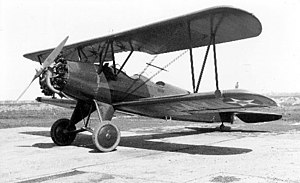The 24th School Wing is a disbanded United States Army Air Corps unit. It was last assigned to the Air Corps Advanced Flying School, and was disbanded on 1 October 1931 at Kelly Field, Texas. While active, the wing served as the headquarters for the Air Corps' three groups training aircrew, which were located in Texas and California.
| 24th School Wing | |
|---|---|
 The Consolidated PT-3 was the standard Air Corps Primary trainer in the late 1920s and early 1930s | |
| Active | 1927–1931 |
| Country | |
| Branch | |
| Type | Command and Control |
| Role | Flying Training |
| Commanders | |
| Notable commanders |
|
The 24th School Wing is not related to the United States Air Force 24th Special Operations Wing, which was established on 19 November 1942.
History edit
The 24th School Wing was organized at Kelly Field, Texas in 1927 to command the flying training units of the Air Corps. Air Corps Flying Schools were located in the San Antonio, Texas area at Kelly Field and at Brooks Field and at March Field near Riverside, California.[1]
In 1922, the Air Corps had reorganized the method it used for pilot training, with Brooks Field, Texas becoming the center for primary training and Kelly Field, Texas the center for advanced training. By 1927, three training squadrons had been set up at Brooks and five at Kelly. With the beginning of the five-year expansion program of the Air Corps in 1926, it was found that the existing facilities in the San Antonio area would be insufficient to support the expansion, and a third training group would need to be established at March Field, a former World War I training field which had been closed in 1922. With a third group of four squadrons at March, a wing was needed as an intermediate level of command to avoid having too many units being assigned directly to school Headquarters at Kelly Field.[2][3] Upon activation at Kelly Field, the wing transferred personnel from the 10th School Group.[1]
In the late 1920s, the growth of the City of San Antonio created hazards for pilot training. In June 1927 General Frank Lahm suggested the construction of a single large field outside of the city to house all flying training. Congress funded the new field's construction but not the purchase of the land, so the city of San Antonio borrowed the $546,000 needed to purchase the site selected for what became Randolph Field. By the fall of 1931, construction was essentially completed at the new facility, so the Air Corps Training Center at Kelly Field and the primary schools at Brooks and March moved to the new installation.[2]
With the opening of facilities at Randolph, the school at March Field was closed and March became a tactical flying field. The 24th School Wing was disbanded on 1 October 1931 and its subordinate units were absorbed into the Air Corps Primary Flying School at Randolph Field and the Advanced Flying School at Kelly Field. Wing personnel were transferred to the 10th School Group[1]
Lineage edit
- Constituted in the Organized Reserve on 23 March 1924 as 24th Wing Headquarters (School)
- Withdrawn from the Organized Reserve 1 August 1927 and allotted to the Regular Army
- Activated on 1 August 1927
- Redesignated as 24th Wing (School) in July 1928
- Redesignated 24th School Wing on 8 March 1929
- Disbanded on 1 October 1931[1]
Assignments edit
- 12th Air Brigade (School), 23 March 1924 (Organized Army Reserve, not active)
- Air Corps Advanced Flying School, 1 August 1927 – 1 October 1931[1]
Components edit
- 10th School Group, 1 August 1927 – 15 July 1931
- Kelly Field, Texas
- 11th School Group, 1 August 1927 – 1 October 1931
- Brooks Field, Texas
- 13th School Group, 1 August 1927 – 30 April 1931
- March Field, California [1]
Stations edit
- Kelly Field, Texas, 1 August 1927 – October 1931[4]
See also edit
References edit
Notes edit
- ^ a b c d e f Clay[page needed]
- ^ a b Manning[page needed]
- ^ Maurer[page needed]
- ^ Mueller, p. 277. Clay gives the location as Duncan Field, which was adjacent to Kelly and housed a depot, while training activities were at Kelly. The two fields merged as Kelly Field during World War II.
Bibliography edit
This article incorporates public domain material from the Air Force Historical Research Agency
- Clay, Steven E. (2011). US Army Order of Battle 1919–1941 (PDF). Vol. 3 The Services: Air Service, Engineers, and Special Troops 1919–1941. Fort Leavenworth, KS: Combat Studies Institute Press. ISBN 978-0-98419-014-0. LCCN 2010022326. OCLC 637712205. Archived from the original (PDF) on 27 September 2013. Retrieved 16 October 2012.
- Manning, Thomas A. (2005), History of Air Education and Training Command, 1942–2002. Office of History and Research, Headquarters, AETC, Randolph AFB, Texas OCLC 71006954, 29991467
- Maurer, Maurer (1987). Aviation in the U.S. Army, 1919–1939 (PDF). Washington, DC: Office of Air Force History, United States Air Force. ISBN 0-912799-38-2. LCCN 87012257. OCLC 15661556. Retrieved 20 July 2013.
- Mueller, Robert (1989). Air Force Bases, Vol. I, Active Air Force Bases Within the United States of America on 17 September 1982 (PDF). Washington, DC: Office of Air Force History. ISBN 0-912799-53-6.